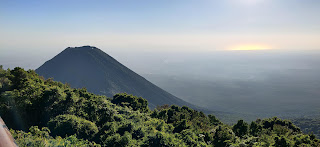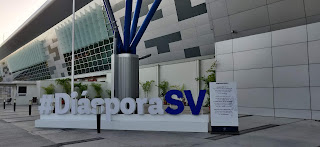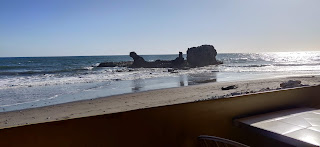Tourism is growing steadily in El Salvador
As part of our series on the state of El Salvador at the beginning of 2023, today we look at tourism. It is an area which represents a clear achievement of the Bukele regime. As the world emerges from depressed travel numbers caused by the COVID-19 pandemic, El Salvador is growing tourism visits and revenues beyond their 2019 pre-COVID levels.
I observed a visible sign of this growth in recent weeks. On two recent visits to the historic center of San Salvador, I saw groups of obvious tourists being led around to sites like the Metropolitan Cathedral and the National Palace by tour guides. These were not the religious or university groups which have long made delegation visits to El Salvador, but were tour groups on vacation trips. That's definitely something new.
Cruise ships are starting to make El Salvador a regular port
of call. Seven cruise ships have already
docked
at the port of Acajutla during the current cruise line season which began
in October. While that is a small number compared to traditional cruise stops such as Costa Rica or Panama, it is a significant increase over the past.
You can also see the expansion of tourism by the growth of
El Salvador listings on the website TripAdvisor, as well as the vacation rental
sites AirBNB and VRBO. New small hotels are regularly being announced along the Pacific coast, although the country is not yet seeing the development of large resorts by chains like Marriott or Hyatt. (And the lack of mega resorts might be a good thing from an environmental standpoint).
The travel publisher Lonely Planet listed El Salvador as one of its "Best in Travel 2023" destinations with this description:
El Salvador is a travel powerhouse in a tiny package. This underrated destination appeals to those looking to get off the beaten path of Central American travel and dive into a multifaceted country with a taste for adventure. Here you'll find world-class surfing on empty, dark-sand beaches; coffee plantations clinging to the sides of volcanoes; pretty flower-filled villages with buildings splashed by murals; and sublime national parks.
The Salvadoran government announced statistics on tourism growth in a recent press release:
According to statistics, in 2022, 2.5 million visitors entered El Salvador, which represented 96% recovery [from 2019].
"We exceeded the goal we had for this year, of 2.4 million visitors," said the Minister of Tourism, Morena Valdez.
In terms of ... the spending of visitors during their stay in the country, it exceeded $2,646 million, which meant a growth of 50% compared to 2019.
"This is because our international visitors are staying longer in the country, they are spending more, and they are using all the tourism items in our value chain: transportation, hotels, restaurants, recreational sites, among others," said the Minister.
 |
| Graphic accompanying press release. |
(There is certainly some reason to question these numbers since there is a basic math mistake on the graphic. If you divide the total tourist spending by the number of tourists and the average length of stay, you get a number less than half the average daily spending ($162) shown on the graphic).
Statistics on airport arrivals are a good proxy for the number of visitors arriving to El Salvador. The most recent statistics from the Salvadoran migration authoritycover the six month period from January to June 2022. During that period, 711,332 persons passed through immigration control at El Salvador’s international airport, a 21% increase over the period from January to June 2019, pre-COVID pandemic.
In another change, in January 2023 the government doubled
the length of tourist visas from 90 days to 180 days. These visas are awarded to arriving tourists
at the El Salvador airport for a payment of $12 USD.
Who is coming to El Salvador? Under the broad heading of tourism we have:
- Members of the Salvador diaspora returning home to visit family
- Central American visitors from Guatemala and Honduras (entering at land borders).
- Tourists traveling for fun and vacation. Included here would be Bitcoin Crypto-tourists coming to see Nayib Bukele's grand experiment of a Bitcoin nation.
One factor driving the growth in tourism is the sophisticated marketing campaign deployed by the Salvadoran government. The same sets of techniques used to burnish the image of the president and his government for the local population are used to put a golden glow around the country's image in international travel circles. Some of this is described in the
One component of this marketing is to use surfing as a way to distribute positive images of El Salvador's Pacific coast beauty. This year, El Salvador will host at least three international surf competitions which will all produce coverage focused on surf and sport and not on political developments in the country. "Surf City" branding is widely visible along the coast and in the government's tourism promotion efforts.
El Salvador also simply has more mind share in the international news space under Nayib Bukele than under prior governments. For better or worse, his initiatives generate attention. And for the true believers in the Bitcoin community, El Salvador is practically a pilgrimage site.
Of course improved perceptions of crime and violence are also helping. Although the US State Department and the Canadian government both have current travel advisories warning of violent crime in El Salvador, public perceptions of incoming tourists have changed markedly now that El Salvador is no longer known as the "murder capital of the world." A friend who rents out a beach house in El Salvador through the website VRBO indicated that bookings are definitely up and that he no longer receives queries asking if it is safe to visit the country.
Tourism has the ongoing potential of bringing jobs and foreign investment into El Salvador. There is ample opportunity to expand tourism from its current levels, and the government is clearly attempting to do so. While the country certainly has its challenges with democracy, the rule of law, human rights and the separation of powers (with which readers of El Salvador Perspectives are well aware), I would still encourage you to come and visit if you have not been here for awhile, and then spread the word.
This YouTube video from a pair of global travelers from Sweden is a perfect way to end this post:




Comments